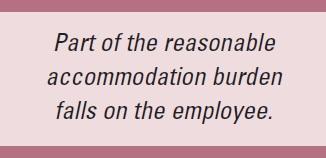Employee won’t even try ADA accommodation? That ends your obligation
Here’s a bit of good news for employers that try to accommodate disabilities but whose efforts are rejected out of hand: When you offer what looks like a reasonable accommodation and an employee refuses to even try it, you are no longer obligated to retain her.
 Simply put, a worker who rejects an offered accommodation is no longer covered by the ADA if she doesn’t even try it first.
Simply put, a worker who rejects an offered accommodation is no longer covered by the ADA if she doesn’t even try it first.
Recent case: Silvia worked for the Philadelphia Water Department as a water technology assistant. Her job included using various chemicals to test water samples.
However, Silvia has asthma and sometimes reacts poorly to chemical exposure. In particular, Silvia complained that she got sick from smelling methyl tertiary butyl ether (MTBE). The Water Department performed a safety audit and concluded that there were no hazardous problems. Even so, it offered Silvia a full-face respirator to use on the job. She tried the respirator a few times, but claimed it made her feel claustrophobic and caused her to have a panic attack.
She then made another request for reasonable accommodations. This time, she wanted a transfer to another position that would entirely shield her from MTBE exposure.
Meanwhile, she filed for workers’ compensation, claiming she was unable to work because of the exposure.
The Water Department refused to consider a transfer. Instead, it offered to fit her with a partial-face respirator that would prevent inhalation of fumes, but perhaps not cause panic attacks. Silvia simply refused to even try the mask. She was then terminated for not coming to work.
Silvia sued, alleging failure to accommodate.
Her claim didn’t go far. The department argued that, because Sylvia refused to even try the accommodation it offered, she couldn’t argue she hadn’t been reasonably accommodated.
The court went further. It concluded that someone who won’t even try an employer’s suggested accommodation is no longer a qualified disabled individual covered by the ADA if she can’t do her job without the accommodation. It said Sylvia’s employer didn’t have to keep on offering different accommodations until she found one she liked.
The court pointed out that part of the accommodation burden falls on the employee. In this case, that meant Silvia should have sought out available help in dealing with the panic attacks she experienced while wearing the full-face respirator. (The Water Department had an employee assistance program she could have used.) Plus, she should at least have tried the new mask. She couldn’t claim it wouldn’t work without that minimal effort. (Yovtcheva v. City of Philadelphia Water Department, No. 12-3089, 3rd Cir., 2013)
Advice: Always consider a wide range of possible accommodations before offering one that seems likely to work well for the employees and for you. If an inexpensive accommodation might work, offer that one first rather than an expensive alternative. For adaptive devices, you don’t have to go with the latest and fanciest approach if an earlier version will do the trick.
Document each step of the process so you can show when and what accommodation you offered, the employee’s reaction and any subsequent modifications.






